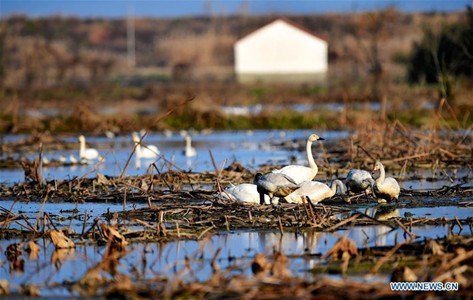
Migratory birds are seen at Poyang Lake, east China's Jiangxi Province, Dec. 28, 2016. According to the monitoring of the Poyang Lake National Nature Reserve, more than 160,000 migratory birds of 14 categories have arrived at the lake area in Jiangxi Province. (Xinhua/Hu Chenhuan)
In winter, Poyang Lake, China's largest freshwater lake, receives thousands of guests from the icy north to its wetlands - flocks of birds, including Siberian cranes, spend their winter here to escape the cold. But their holiday home is at risk of vanishing.
One of the only two large lakes connected to the Yangtze River, Poyang Lake has been suffering from extreme droughts over the past decade, hitting its pre-drought average low water level about 54 days earlier than it did in years past.
This has led to an overall water shortage, both for humans and animals, with the lake shrinking and places which were once covered in water now exposed year-round.
Pressure on the fragile ecosystem of the lake - not from excessive dryness but from excessive wetness - is also mounting as the government of East China's Jiangxi Province has proposed building a dam on the lake to control the water level, which has been slammed by many environmentalists and scientists.
Threatened ecology
"The dam project will definitely damage the ecosystem of Poyang Lake as it is a habitat for migratory birds and the rare Yangtze finless porpoise. It would also increase the chance of flooding," Lei Guangchun, director of the School of Nature Conservation at Beijing Forestry University, told the Global Times on Tuesday. The raised water level would inundate the wetlands in which migratory birds usually find their food and make it harder for them to eat enough, said Lei.
"A dam-free project is the best option for Poyang Lake to sustain a healthy ecological system," said the World Wide Fund for Nature, the international environmentalist group, which is challenging the regional authorities' decision.
Poyang Lake's ecological problems are mainly due to external factors, and the winter dry season changes cannot be regarded as the sole reason for its worsening ecology, the Jiu San Society, a non-communist political party in China, wrote on its official website in early December.
"Its natural situation sees the lake's bed exposed in winter. The dam would change this. If the dam is built, in the high-water season the lake can no longer help the Yangtze discharge excess water," Dai Xingyi, a professor in the Department of Environmental Science and Engineering at Shanghai's Fudan University, told the Global Times.
Experts also speculate whether the dam will have an impact beyond the lake's ecology. The dam project would require massive water storage in winter, which as a result would significantly affect the Yangtze's lower reaches, Zhou Jianjun, a professor at the Department of Water Conservancy of Tsinghua University was quoted by thepaper.cn as saying. About 70 percent of Shanghai's drinking water comes from the Yangtze, he said.
The situation will further worsen if Dongting Lake, China's second largest freshwater lake, also builds a dam in the future, as those dams would intercept billions of cubic meter of waters from the Yangtze, Zhou said.
Survival of the fittest
The Poyang dam project was first proposed in the 1980s. The local government at the time thought it would help control fluctuations in the lake's water level, which varied widely between the rainy season and dry season and put a damper on the area's economic development.
The specific dam project proposed by the Jiangxi government in 2002 aimed to accomplish functions including flood prevention, electricity generation, irrigation and shipping, but the plans met strong opposition. After being adjusted many times, the government decided to build a sluice gate to store water in the winter.
"The dam project will expand water volume in dry season and avoid the exposure of the lake bed. The food selection for the Yangtze finless porpoise will increase," the Jiangxi water department said on its website in November.
Facing environmentalist opposition, Ji Weitao, the deputy director of the project's construction office was quoted by the Beijing News as saying that "the worst scenario is that birds will survive by changing their dietary patterns."
Ji said that "Men die for money, birds die for food. If there is not enough grass for birds, they can catch fish or eat the corn and sweet potatoes in the fields. It is the survival of the fittest."
The 2,993-meter proposed sluice gate is projected to cost about 13 billion yuan ($1.9 billion) and will better connect the lake with the Yangtze, according to the Jiangxi government.
"The Jiangxi government did not fully reveal the arguments against building the dam to the public, especially questions about whether such large amounts of investment will benefit the people," said Dai.
Although the Jiangxi government says it has abandoned plans to generate electricity at the dam, previous projects show that they could add this function later, said Zhou, adding that the low water season problem in the Poyang Lake can be solved through other ways, he said.
"The Three Gorges Dam could be controlled so it does not intercept small-scale flooding during flood season. And the water supply and irrigation problems around the lake can be solved through diversions and digging wells, which have a smaller cost and environmental impact."


















































